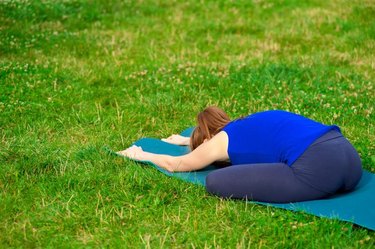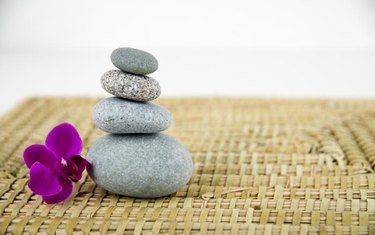
A sticky mat is pretty much a must for yoga, but it's safety is in question. Yes, the mat will keep you from slipping and falling — but it contains chemicals that may linger in your system for years.
Many mainstream yoga mats are made from PVC, polyvinyl chloride, which is basically vinyl. It's 57 percent chlorine and 43 percent carbon making it extremely durable, spongy and easy to clean, but not so great for the environment. Increasingly, concerns about PVC and the phthalates added to it to make your mat flexible have come to the forefront.
Video of the Day
Video of the Day
Read More: The 5 Best Eco-Friendly Yoga Mats
About PVC and Other Possible Mat Toxins
PVC is popular for yoga mats because it's cheap and effective. To make the vinyl pliable for practice, it's treated with phthalates, lead and cadmium. Phthalates aren't just in yoga mats, they're in hundreds of products, including car interiors, electrical cords, furniture, hoses, roofing, rainwear and hospital flooring.

Phthalates are considered safe, according to many governing scientific bodies in the U.S. and around the world, but that's when you're exposure is at "typical" levels. However, certain types have negatively affected reproduction in laboratory animals, reports the Centers for Disease Control and Prevention. The CDC does recommend more research be done on the effects of phthalates on human health.
One specific phthalate, DEHP, or diethylhexyl phtalate_,_ is a suspected carcinogen. It is being phased out, but other phthalates can still pose possible health risks.
Lead and cadmium can have negative effects on your brain, again if exposure is excessive, which is unlikely to happen from just your yoga mat. The concern, however, is that your yoga mat compounds your exposure to all the other products with these contaminants and thus poses a risk.
Environmental Complications
Environmental concerns about PVC are real. You can't recycle it, and when you try to dispose of it through incineration or having it buried in a landfill, it releases dioxin — a cancer-causing chemical.
Production of PVC mats also emits chemicals, including chlorine gas, mercury and vinyl chloride, into the atmosphere.
To Be Safe
To limit your PVC exposure and support chemical-free mats, opt for those made from natural rubber. These may still smell a little when you first use them due to natural dyes and the nature of the material.

Other mat options are those made from jute, a natural plant material. If you're not sure about your mat's contents, contact the manufacturer or when you go to purchase one, look for the label "PVC free."
Read More: Do You Need to Use a Yoga Mat?